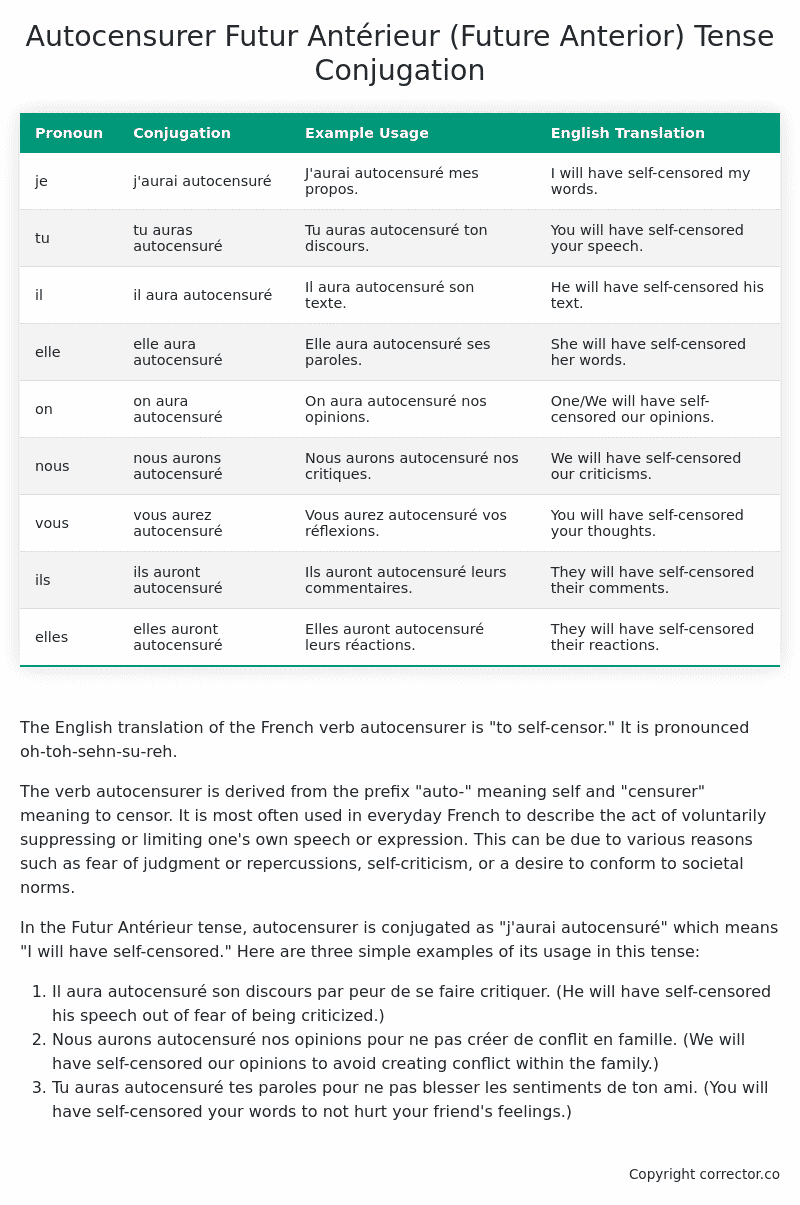Futur Antérieur (Future Anterior) Tense Conjugation of the French Verb autocensurer
Introduction to the verb autocensurer
The English translation of the French verb autocensurer is “to self-censor.” It is pronounced oh-toh-sehn-su-reh.
The verb autocensurer is derived from the prefix “auto-” meaning self and “censurer” meaning to censor. It is most often used in everyday French to describe the act of voluntarily suppressing or limiting one’s own speech or expression. This can be due to various reasons such as fear of judgment or repercussions, self-criticism, or a desire to conform to societal norms.
In the Futur Antérieur tense, autocensurer is conjugated as “j’aurai autocensuré” which means “I will have self-censored.” Here are three simple examples of its usage in this tense:
- Il aura autocensuré son discours par peur de se faire critiquer. (He will have self-censored his speech out of fear of being criticized.)
- Nous aurons autocensuré nos opinions pour ne pas créer de conflit en famille. (We will have self-censored our opinions to avoid creating conflict within the family.)
- Tu auras autocensuré tes paroles pour ne pas blesser les sentiments de ton ami. (You will have self-censored your words to not hurt your friend’s feelings.)
Table of the Futur Antérieur (Future Anterior) Tense Conjugation of autocensurer
| Pronoun | Conjugation | Example Usage | English Translation |
|---|---|---|---|
| je | j’aurai autocensuré | J’aurai autocensuré mes propos. | I will have self-censored my words. |
| tu | tu auras autocensuré | Tu auras autocensuré ton discours. | You will have self-censored your speech. |
| il | il aura autocensuré | Il aura autocensuré son texte. | He will have self-censored his text. |
| elle | elle aura autocensuré | Elle aura autocensuré ses paroles. | She will have self-censored her words. |
| on | on aura autocensuré | On aura autocensuré nos opinions. | One/We will have self-censored our opinions. |
| nous | nous aurons autocensuré | Nous aurons autocensuré nos critiques. | We will have self-censored our criticisms. |
| vous | vous aurez autocensuré | Vous aurez autocensuré vos réflexions. | You will have self-censored your thoughts. |
| ils | ils auront autocensuré | Ils auront autocensuré leurs commentaires. | They will have self-censored their comments. |
| elles | elles auront autocensuré | Elles auront autocensuré leurs réactions. | They will have self-censored their reactions. |
Other Conjugations for Autocensurer.
Le Present (Present Tense) Conjugation of the French Verb autocensurer
Imparfait (Imperfect) Tense Conjugation of the French Verb autocensurer
Passé Simple (Simple Past) Tense Conjugation of the French Verb autocensurer
Passé Composé (Present Perfect) Tense Conjugation of the French Verb autocensurer
Futur Simple (Simple Future) Tense Conjugation of the French Verb autocensurer
Futur Proche (Near Future) Tense Conjugation of the French Verb autocensurer
Plus-que-parfait (Pluperfect) Tense Conjugation of the French Verb autocensurer
Passé Antérieur (Past Anterior) Tense Conjugation of the French Verb autocensurer
Futur Antérieur (Future Anterior) Tense Conjugation of the French Verb autocensurer (this article)
Subjonctif Présent (Subjunctive Present) Tense Conjugation of the French Verb autocensurer
Subjonctif Passé (Subjunctive Past) Tense Conjugation of the French Verb autocensurer
Subjonctif Imparfait (Subjunctive Imperfect) Tense Conjugation of the French Verb autocensurer
Conditionnel Présent (Conditional Present) Tense Conjugation of the French Verb autocensurer
Conditionnel Passé (Conditional Past) Tense Conjugation of the French Verb autocensurer
L’impératif Présent (Imperative Present) Tense Conjugation of the French Verb autocensurer
L’infinitif Présent (Infinitive Present) Tense Conjugation of the French Verb autocensurer
Struggling with French verbs or the language in general? Why not use our free French Grammar Checker – no registration required!
Get a FREE Download Study Sheet of this Conjugation 🔥
Simply right click the image below, click “save image” and get your free reference for the autocensurer Futur Antérieur tense conjugation!

Autocensurer – About the French Futur Antérieur (Future Anterior) Tense
Construction
Common Everyday Usage Patterns
Interactions with Other Tenses
For example
Summary
I hope you enjoyed this article on the verb autocensurer. Still in a learning mood? Check out another TOTALLY random French verb conjugation!


